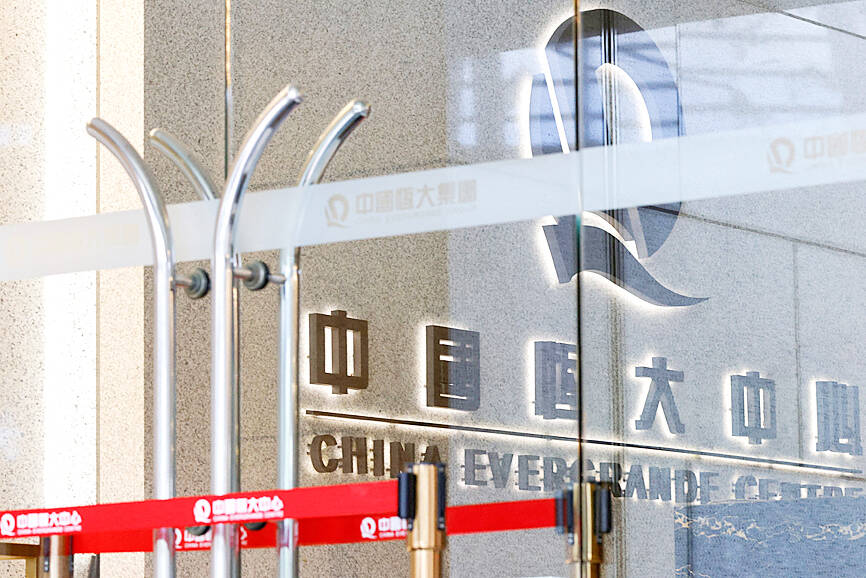Struggling property giant China Evergrande Group (恆大集團) has had a lucrative building plot in suburban Hong Kong sold off by its US receiver to cover a portion of the company’s massive debts, according to the company’s filings.
The undeveloped plot in the border district of Yuen Long was sold for nearly US$637 million, with Evergrande saying it expected to record a loss of approximately US$770 million on the land, according to a statement filed on the Hong Kong stock exchange on Sunday.
“The proceeds from such sale will be used to repay the company’s financial obligations in relation to the project,” Evergrande said.

Photo: Reuters
The Yuen Long land was first seized as security by the Los Angeles-based asset management fund Oaktree Capital Management LLC in January last year when Evergrande defaulted on US$600 million it had borrowed.
Evergrande spent more than US$1.13 billion to obtain the vast plot next to Hong Kong’s Mai Po Nature Reserve, an internationally significant wetland known as a “paradise for birds.”
The group originally proposed to develop 268 villas on the land, with a huge palace-like mansion at the center that it hoped to sell for US$510 million.
Hong Kong media last week reported that three mansions in the city’s prestigious Peak district owned by Evergrande founder Hui Ka Yan (許家印) had been seized by the China Construction Bank (中國建設銀行) and Japanese financier Orix Corp as repayment for loans.
The total market value of the three mansions was estimated to be US$318 million, according to online news outlet HK01.
The company is also looking to sell its headquarters in Hong Kong which occupies a highly sought-after patch of land on the harbor front.
Evergrande was due to unveil a restructuring plan in July, but the announcement was postponed to an unspecified date. Trading of Evergrande shares listed in Hong Kong has been suspended since late March.

UNCERTAINTY: Innolux activated a stringent supply chain management mechanism, as it did during the COVID-19 pandemic, to ensure optimal inventory levels for customers Flat-panel display makers AUO Corp (友達) and Innolux Corp (群創) yesterday said that about 12 to 20 percent of their display business is at risk of potential US tariffs and that they would relocate production or shipment destinations to mitigate the levies’ effects. US tariffs would have a direct impact of US$200 million on AUO’s revenue, company chairman Paul Peng (彭雙浪) told reporters on the sidelines of the Touch Taiwan trade show in Taipei yesterday. That would make up about 12 percent of the company’s overall revenue. To cope with the tariff uncertainty, AUO plans to allocate its production to manufacturing facilities in

TAKING STOCK: A Taiwanese cookware firm in Vietnam urged customers to assess inventory or place orders early so shipments can reach the US while tariffs are paused Taiwanese businesses in Vietnam are exploring alternatives after the White House imposed a 46 percent import duty on Vietnamese goods, following US President Donald Trump’s announcement of “reciprocal” tariffs on the US’ trading partners. Lo Shih-liang (羅世良), chairman of Brico Industry Co (裕茂工業), a Taiwanese company that manufactures cast iron cookware and stove components in Vietnam, said that more than 40 percent of his business was tied to the US market, describing the constant US policy shifts as an emotional roller coaster. “I work during the day and stay up all night watching the news. I’ve been following US news until 3am

Taiwan will prioritize the development of silicon photonics by taking advantage of its strength in the semiconductor industry to build another shield to protect the local economy, National Development Council (NDC) Minister Paul Liu (劉鏡清) said yesterday. Speaking at a meeting of the legislature’s Economics Committee, Liu said Taiwan already has the artificial intelligence (AI) industry as a shield, after the semiconductor industry, to safeguard the country, and is looking at new unique fields to build more economic shields. While Taiwan will further strengthen its existing shields, over the longer term, the country is determined to focus on such potential segments as

COLLABORATION: Given Taiwan’s key position in global supply chains, the US firm is discussing strategies with local partners and clients to deal with global uncertainties Advanced Micro Devices Inc (AMD) yesterday said it is meeting with local ecosystem partners, including Taiwan Semiconductor Manufacturing Co (TSMC, 台積電), to discuss strategies, including long-term manufacturing, to navigate uncertainties such as US tariffs, as Taiwan occupies an important position in global supply chains. AMD chief executive officer Lisa Su (蘇姿丰) told reporters that Taiwan is an important part of the chip designer’s ecosystem and she is discussing with partners and customers in Taiwan to forge strong collaborations on different areas during this critical period. AMD has just become the first artificial-intelligence (AI) server chip customer of TSMC to utilize its advanced